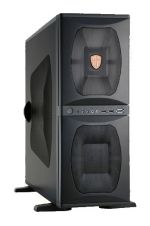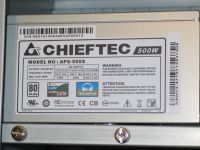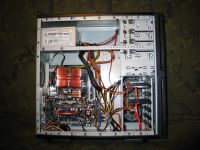|
Chieftec Aegis CX-05B-B

Power Supply
 Chieftec included a 500w power supply with this case; the case can be purchased with or without PSU, as you like. One thing I noticed immediately about this PSU was the cable length—short! The SATA power connectors barely reached the top three slots of the hard drive bay, and the molex connectors were no better. The PCI Express power connectors were similarly foreshortened, which might cause problems for anyone trying to assemble a SLI or Crossfire rig right out of the box. The lack of sleeving on anything but the 24-pin ATX mainboard connector might also be considered unsightly by some, though with cables this short, the extra bit of flexibility afforded by the lack is sometimes needed.
Chieftec included a 500w power supply with this case; the case can be purchased with or without PSU, as you like. One thing I noticed immediately about this PSU was the cable length—short! The SATA power connectors barely reached the top three slots of the hard drive bay, and the molex connectors were no better. The PCI Express power connectors were similarly foreshortened, which might cause problems for anyone trying to assemble a SLI or Crossfire rig right out of the box. The lack of sleeving on anything but the 24-pin ATX mainboard connector might also be considered unsightly by some, though with cables this short, the extra bit of flexibility afforded by the lack is sometimes needed.
TEST MACHINE
| PSU Test Results | ||||
| 5V DC | 12V DC | |||
| BIOS Reported | Actual | BIOS Reported | Actual | |
| At Boot | 4.99 | 5.02 | 12.25 | 12.25 |
| Idle | 4.97 | 5.02 | 12.25 | 12.26 |
| Load | 4.97 | 5.01 | 12.25 | 12.27 |
| At Shutdown | (n/a) | 5.01 | (n/a) | 12.28 |
*Note: Load values were produced with Orthos and Half Life 2: Lost Coast Stress Test running concurrently for ~15min.
As you can see, the performance numbers were rock solid. Going from idle to full burn barely caused the voltage to twitch, and throughput remained near or even slightly above ideal right up to power-down, especially on the all-important 12VDC rails. Compared with the general quality of pack-in PSUs, this was a pleasant surprise.
Sound and Heat
One area in which the Aegis falls down is in airflow. Placing the intake fan slots on the side of the case might make sense for cooling the hard drive bay, but everything rearward of that suffers from turbulence issues. Additionally, the review case came with no fans whatever, save the one built into the PSU. This is a glaring omission for an enthusiast class case in this price range (~$140 at time of writing). The PSU provides some evacuation of waste heat, but getting one or more 90mm intake fans is highly recommended to avoid heat-related issues with the hard drives.
Another area in which this case falls short is noise compensation. Chieftec chose to make the structural components and exterior panels of the chassis out of steel which gives this case a solid feel and overall good construction. On the otherhand, the case's peculiar internal layout, caused even the quiet Zalman coolers on my CPU and graphics card to generate a loud, echoing whirr all out of proportion with their open-air noise levels. Mesh-sided cases are not known for their noise-dampening properties, but this case is unusual in its loudness.
Conclusion
Chieftec made a valiant effort to innovate with this case, but fell somewhat short of the mark. The combination of useful and odd mis-steps makes the Chieftec Aegis a decidedly mixed bag. The æsthetics may appeal to some, but for $140 (directron.com), there are much better enclosures to be had.





